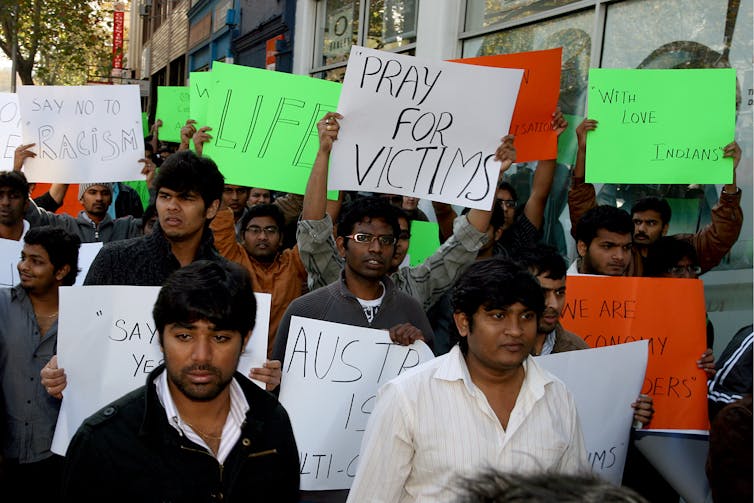Source: The Conversation (Au and NZ) – By Andrew Deuchar, Postdoctoral Researcher, Australia India Institute and Melbourne Graduate School of Education, The University of Melbourne

Shutterstock
As Australia welcomes back international students, it’s a time for education providers to re-imagine how they cater to these students. Our research shows helping them to build strong connections with other students, as well as employers, makes them more likely to have a productive and fulfilling time in Australia and to find suitable work when they graduate.
Australia has an opportunity to emerge as a leading destination not just for a world-class education, but as one that fosters deep social, cultural and economic engagement with these students.
We must not return to the status quo. Before the pandemic, international students faced many challenges, including racism, visa restrictions and insecure work. Research shows they are much more likely than domestic students to experience social isolation, financial insecurity and mental health issues.
Australia cannot afford to neglect the welfare of international students. The sector contributed A$37.6 billion to the economy in the financial year before the pandemic, but that fell to $26.7 billion in 2020-21. Rebuilding international education is a critical part of Australia’s economic recovery.
And the key to improving international students’ welfare and experience in Australia is building stronger social connections among them.

Shutterstock
What did the research find?
In 2020, the Department of Education Skills and Employment commissioned the Australia India Institute – in partnership with Austrade and the Group of Eight Australia – to investigate the experiences of Indian international students in Australia.
Our research complemented quantitative studies by interviewing these students at 11 universities across Australia. One of the most striking findings was that those who had strong social connections with other Indian students had a much more productive experience than those who did not.
One research participant befriended three other Indian students who he moved in with when he arrived in Australia. It was much more cost-effective for them to pool their resources to buy groceries and pay the rent. But, more than that, he said:
“When you have company your mind can rest, you can be at ease and enjoy your studies.”
In contrast, another international student who lived alone said:
“My life in Australia is so quiet, when I lay in bed I can hear my heartbeat.”
When students with strong social connections did experience hardships, other international students were usually their most crucial supports.
During COVID-19 lockdowns, these students shared vital information through WhatsApp about where and how to get financial support and food. One student said she would have “not eaten for a week” if she was not made aware of these resources.
Read more:
‘God, I miss fruit!’ 40% of students at Australian universities may be going without food
The supports Indian international students provided each other weren’t just social and emotional. They also formed informal study groups where they could share their challenges and ideas about assignments. One student said:
“Together we learn so much more than one person can do by himself.”
International students who were connected with each other were also more likely to build connections with domestic students. The main reason for this was that having strong connections with each other gave them the confidence to socialise and attend events in groups. One student explained that because he had a close group of Indian friends he spent more time doing “things that Aussies do, like going to the pub and watching the AFL”.
Benefits go beyond the study experience
In light of these findings, our report argues that international students’ experiences will be much more productive and fulfilling when they have strong connections with each other.
Another key finding is that international students with a strong social network are much more likely to find suitable employment while studying and after graduating.
Some students reported being underpaid and exploited in part-time jobs and felt there was little they could do about it. This was especially true of those who had recently arrived in Australia and did not have strong social connections. One student who worked in a bakery said:
“My employer told me I would get a pay rise if I proved I was reliable. After one month I asked for the pay rise and I was taken off the roster.”
Those with stronger links with members of the Indian community – including but not limited to students – fared better.
They shared information about who to work for and who to avoid. They also helped each other write effective resumes. This was crucial in finding part-time work, which future employers would recognise.
Graduates with strong social connections also had more success getting jobs related to their degrees.
What can institutions and policymakers do?
Our findings put a different spin on how education providers can help their students and graduates find work. Alongside regular career guidance and support focused on the individual, our report argues that providers should consider how they can build connections between international students and with potential employers.
Addressing the challenges international students face is a critical part of the education sector’s recovery from the pandemic. It will not only consolidate Australia’s position as a leader in world-class education, but also improve the welfare of the students themselves.
If education providers help international students build their social connections, the flow-on effects will be huge.
They will be much more likely to have a fulfilling study experience and more likely to find suitable jobs once they graduate.
Better support for international students is also likely to encourage others to study in Australia.
As international students return to Australia, there’s a lot we need to do differently. Practitioners and policymakers need to consider exactly how they can nurture and sustain international students’ social connections.
These students are already supporting each other in a range of creative and effective ways. We need to recognise their efforts. And to learn from them.
![]()
Andrew Deuchar works for The University of Melbourne. The research this article refers to was commissioned by the Commonwealth Department of Education, Skills and Employment.
– ref. As international students return, let’s not return to the status quo of isolation and exploitation – https://theconversation.com/as-international-students-return-lets-not-return-to-the-status-quo-of-isolation-and-exploitation-173489




